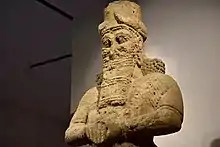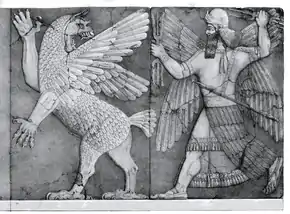Nabu
Nabu (Akkadian: cuneiform: 𒀭𒀝 Nabû[1] Syriac: ܢܵܒܼܘܼ\ܢܒܼܘܿ\ܢܵܒܼܘܿ Nāvū or Nvō or Nāvō[2][3]) is the ancient Mesopotamian patron god of literacy, the rational arts, scribes and wisdom.
| Nabû | |
|---|---|
 Colossal statue of the god Nabu, 8th century BC, from Nimrud, on display in the National Museum of Iraq | |
| Abode | Borsippa |
| Planet | Mercury |
| Symbol | Clay tablet and stylus |
| Parents | Marduk and Sarpanitum |
| Consort | Tashmet |
| Equivalents | |
| Greek equivalent | Hermes |
| Roman equivalent | Mercury |
| Egyptian equivalent | Thoth |
| Part of a series on |
| Ancient Mesopotamian religion |
|---|
 Chaos Monster and Sun God |
| Related topics |
| Part of the myth series on |
| Religions of the ancient Near East |
|---|
| Pre-Islamic Arabian deities |
| Arabian deities of foreign origin |
|
Etymology and meaning
The Akkadian "nabû" means "to announce, prophesize", derived from the Semitic root N-B.[4] It is cognate with the Syriac ܢܒܝܐ(nvīyā), Arabic نبي (nabiyy), and the Hebrew נביא (naví), all meaning "prophet".
History
Nabu was worshiped by the Babylonians and the Assyrians.[5] Nabu was known as Nisaba in the Sumerian pantheon and gained prominence among the Babylonians in the 1st millennium BC when he was identified as the son of the god Marduk.[5]
Nabu was worshipped in Babylon's sister city Borsippa, from where his statue was taken to Babylon each New Year so that he could pay his respects to his father.[5] Nabu's symbols included a stylus resting on a tablet as well as a simple wedge shape; King Nabonidus, whose name references Nabu, had a royal sceptre topped with Nabu's wedge.[5][6]:33–34 Clay tablets with especial calligraphic skill were used as offerings at Nabu's temple. His wife was the Akkadian goddess Tashmet.[5]
Nabu was the patron god of scribes, literacy, and wisdom.[5] He was also the inventor of writing, a divine scribe, the patron god of the rational arts, and a god of vegetation.[6]:33–34[7] As the god of writing, Nabu inscribed the fates assigned to men and he was associated with the scribe god Ninurta.[7][8] As an oracle he was associated with the Mesopotamian moon god Sin.[6]:33–34
Nabu wore a horned cap, and stood with his hands clasped in the ancient gesture of priesthood. He rode on a winged dragon known as Sirrush that originally belonged to his father Marduk. In Babylonian astrology, Nabu was identified with the planet Mercury.[9][10]
Nabu was continuously worshipped until the 2nd century, when cuneiform became a lost art.[5]
Outside Mesopotamia
Nabu's cult spread to ancient Egypt.[11] Nabu was one of five non-Egyptian deities worshipped in Elephantine.
In the Bible, Nabu is mentioned as Nebo in Isaiah 46:1 and Jeremiah 48:1.[5][12][13]
In Hellenistic times, Nabu was sometimes identified with the Greek Apollo as a giver of prophesies.[5][6]:71 As the god of wisdom and a divine messenger associated with the planet Mercury, Nabu was linked with the Greek Hermes, the Roman Mercury, and the Egyptian Thoth.[6]:71
References
- Lanfranchi, Giovanni B. (1987). The Correspondence of Sargon II. Helsinki: Helsinki University Press. p. 92. ISBN 9515700043.
- "Dukhrana Lexicon Lookup". Dukhrana Analytical Lexicon of the Syriac New Testament. Dukhrana Biblical Research. Retrieved 17 January 2021.
- "The Comprehensive Aramaic Lexicon". The Comprehensive Aramaic Lexicon. Retrieved 17 January 2021.
- "Semitic Roots Appendix". The American Heritage Dictionary. Retrieved 6 December 2019.
nbʾ To name, proclaim, summon."
- Bertman, Stephen (2005). Handbook to Life in Ancient Mesopotamia (Paperback ed.). Oxford: Oxford University Press. p. 122. ISBN 9780195183641. Retrieved 2016-08-08.
- Green, Tamara M. (1992). The City of the Moon God: Religious Traditions of Harran. Leiden: E.J. Brill. ISBN 9004095136. Retrieved 2017-01-04.
- "Nabu". Encyclopedia Britannica. Archived from the original on July 2, 2016. Retrieved August 4, 2019.
- Leick, Dr Gwendolyn (2002). A Dictionary of Ancient Near Eastern Mythology. Routledge. p. 127. ISBN 9781134641024. Retrieved March 7, 2019.
- Colligan, L. H. (January 15, 2010). Mercury. Marshall Cavendish. p. 22. ISBN 9780761445517. Retrieved March 7, 2019.
- Lewis, James R. (Mar 1, 2003). The Astrology Book: The Encyclopedia of Heavenly Influences (Second ed.). Visible Ink Press. p. 442. ISBN 9781578593019. Retrieved March 7, 2019.
- Porten, Bezalel (1968). Archives from Elephantine: The Life of an Ancient Jewish Military Colony (First ed.). University of California Press. p. 166. ISBN 9780520010284. Retrieved October 4, 2019.
- "Isaiah 46:1 NIV – Gods of Babylon – Bel bows down, Nebo". BibleGateway.com. Retrieved 2015-06-23.
- "Jeremiah 48:1 NIV – A Message About Moab – Concerning Moab". BibleGateway.com. Retrieved 2015-07-02.
External links
- . New International Encyclopedia. 1905.
.jpg.webp)